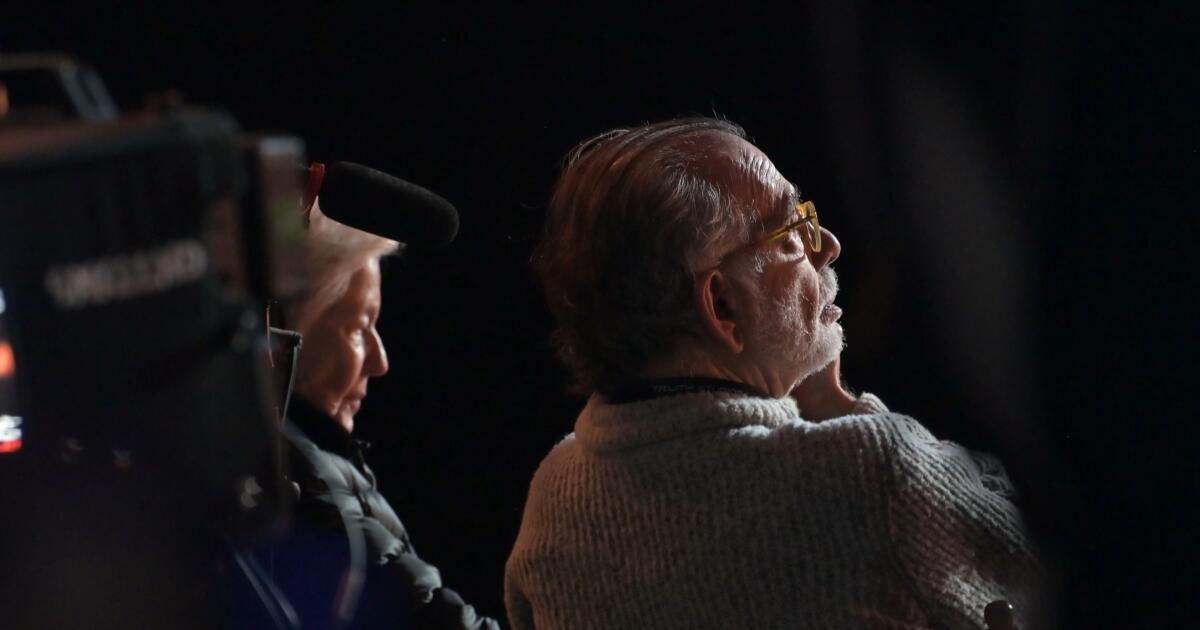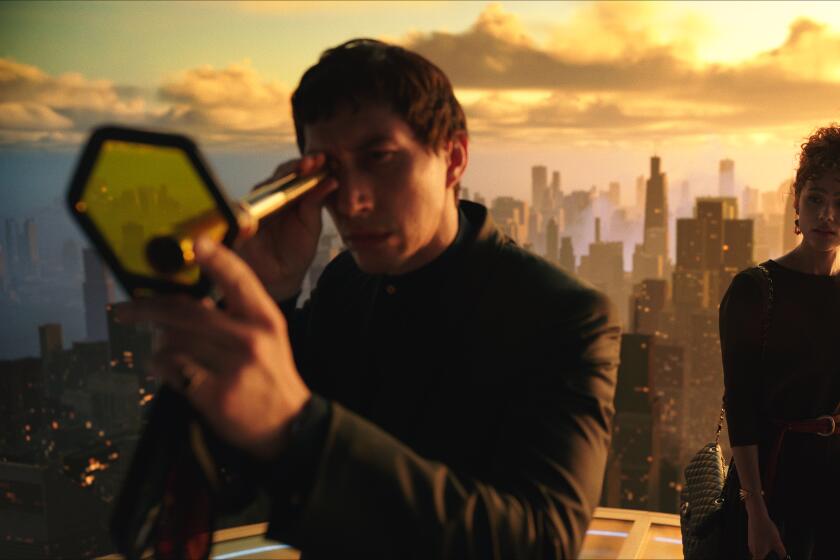
In the documentary “Megadoc,” which follows Francis Ford Coppola’s passion project “Megalopolis,” director Mike Figgis observes that the most compelling behind-the-scenes films are usually about things going wrong.
This creates a difficult situation for Figgis: does he prioritize what’s best for his own movie, or does he want to help Coppola finally achieve his lifelong dream? Although his documentary doesn’t directly address this conflict, it ultimately feels unresolved, which weakens the film. Figgis captures some truly tense and dramatic moments, but his admiration for Coppola prevents him from fully exploring the complexities of the situation.
To fund his ambitious film, “Megalopolis,” Francis Ford Coppola reportedly spent $120 million of his own money, partially by selling off parts of his wine business. The film occasionally displays the massive costs of production – for example, $27 million for the art department and $7 million for costumes. Set in a futuristic New York City but filmed around Atlanta, the movie combines a story inspired by ancient Rome with a modern setting to create a fantastical story about money, influence, and political maneuvering.
Despite moments of real beauty, warmth, and even inspiration, “Megalopolis” ultimately feels overwhelming. It’s as if Coppola aimed for a sweeping statement about humanity and the future, but became lost in the sheer scale of his own ambitious vision.

Movies
Featuring strong performances from Adam Driver, Giancarlo Esposito, and a captivating Aubrey Plaza, the acclaimed director’s newest film is generating excitement at the Cannes Film Festival.
While not a complete guide to understanding “Megalopolis,” “Megadoc” offers valuable and thought-provoking glimpses into the film, showing conflicts that ultimately find resolution. Especially now, when seeing “Megalopolis” itself is challenging-though local screenings at places like Eastwood Performing Arts Center are an exception-“Megadoc” might be the best way for dedicated fans to connect with this unique and admired work.
The shadow of Francis Ford Coppola’s “Apocalypse Now” – and the fascinating 1991 documentary about its troubled production, “Hearts of Darkness,” looms large. That documentary, directed by Fax Bahr and George Hickenlooper using footage shot by Coppola’s wife, Eleanor, is often hailed as one of the greatest behind-the-scenes looks at filmmaking ever created.
The connection between them is highlighted by the fact that Eleanor is the very first person we hear in “Megadoc,” as she speaks to her husband. It’s incredibly moving to see Francis and Eleanor – who sadly passed away in April 2024 just before the release of “Megalopolis” – celebrating their 60th wedding anniversary on set with the film’s cast and crew.
Francis Coppola compared making “Megalopolis” to his film “Apocalypse Now,” saying the new production has even more red tape and isn’t adapting to his vision quickly enough. He pointed out that “Megalopolis” is a larger undertaking than “Apocalypse Now,” despite the challenges of using military helicopters and managing logistics on that earlier film. Actor Shia LaBeouf also referenced “Apocalypse Now,” expressing concern he might be fired from “Megalopolis” like Harvey Keitel was from Coppola’s previous movie.
Similar to the film “Megalopolis,” Adam Driver and Nathalie Emmanuel aren’t the focus of “Megadoc.” Supporting actors Shia LaBeouf and Aubrey Plaza end up stealing the show. Driver and Emmanuel both seemed hesitant to be filmed during production, opting for more structured interviews, which makes them feel less prominent in the documentary.
Shia LaBeouf was surprised to even get the role, admitting he was completely out of favor in the industry. This led him to obsessively discuss even minor details, sometimes frustrating director Francis Ford Coppola. Jenny Slate, however, embraced the project with playful energy, mirroring Coppola’s own creative spirit. A memorable, though ultimately cut, scene shows Slate playfully challenging Dustin Hoffman to an arm-wrestling match – a moment everyone on set enjoyed witnessing.

Francis Ford Coppola’s documentary, directed by Fred Figgis (known for “Leaving Las Vegas”), doesn’t push for revealing answers or delve into difficult questions. It mostly presents what Coppola offers. While the film shows the well-publicized incident of Coppola firing his visual effects supervisor and the art department quitting, it doesn’t explore the underlying reasons. Furthermore, the documentary completely avoids addressing accusations that Coppola behaved inappropriately with background actors during a party scene, which led to legal disputes.
The movie ends with the premiere of “Megalopolis” at the Cannes Film Festival. It doesn’t show an earlier, poorly received screening in Los Angeles, which led to negative buzz and made it difficult to find a major distributor. The film’s marketing also struggled, including a trailer released by Lionsgate that falsely attributed positive quotes to critics.
I went into “Megadoc” expecting a behind-the-scenes disaster story, something like “Hearts of Darkness” or “Jodorowsky’s Dune” – a film about a production completely falling apart. But that’s not what it is at all. Instead, it’s a fascinating look at an artist relentlessly pursuing his vision, throwing everything he has – financially and personally – into a project, even if he’s not entirely sure he’ll ever actually *finish* it. It’s less about failure, and more about the obsessive creative process itself.
Coppola stubbornly spent a lot of time trying to achieve a specific lighting effect directly on set, even though many suggested it would be simpler to add it later using digital tools. However, his persistence paid off – the final shot, where light appears to emanate from Driver’s face, is remarkably stunning and a highlight of “Megalopolis.”
Coppola admits the final product wasn’t quite what he envisioned, falling short of his initial goals. However, staying true to his nature as a bold and unconventional filmmaker who always takes risks, he believes the effort was still worthwhile. While Figgis didn’t achieve the dramatic failure he expected, Coppola feels he ultimately got a return on his investment.
Read More
- Clash Royale Best Boss Bandit Champion decks
- Mobile Legends November 2025 Leaks: Upcoming new heroes, skins, events and more
- PUBG Mobile or BGMI A16 Royale Pass Leaks: Upcoming skins and rewards
- The John Wick spinoff ‘Ballerina’ slays with style, but its dialogue has two left feet
- Kingdom Rush Battles Tower Tier List
- Clash Royale Season 77 “When Hogs Fly” November 2025 Update and Balance Changes
- Delta Force Best Settings and Sensitivity Guide
- Vampire’s Fall 2 redeem codes and how to use them (June 2025)
- Stocks stay snoozy as Moody’s drops U.S. credit—guess we’re all just waiting for the crash
- ‘Australia’s Most Sexually Active Woman’ Annie Knight reveals her shock plans for the future – after being hospitalised for sleeping with 583 men in a single day
2025-09-20 01:01